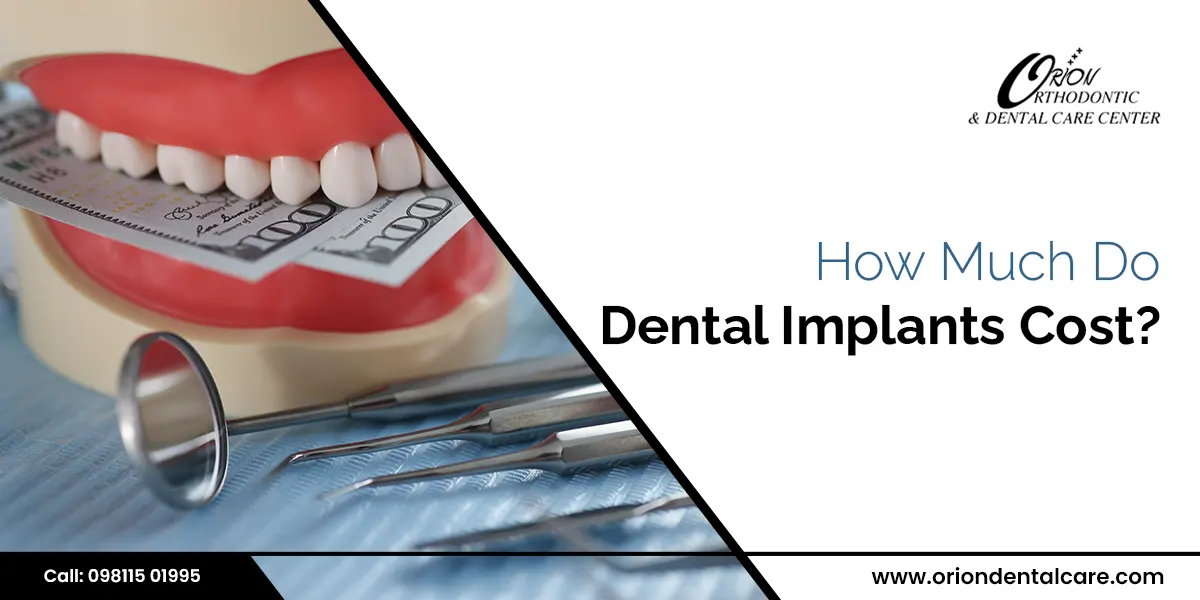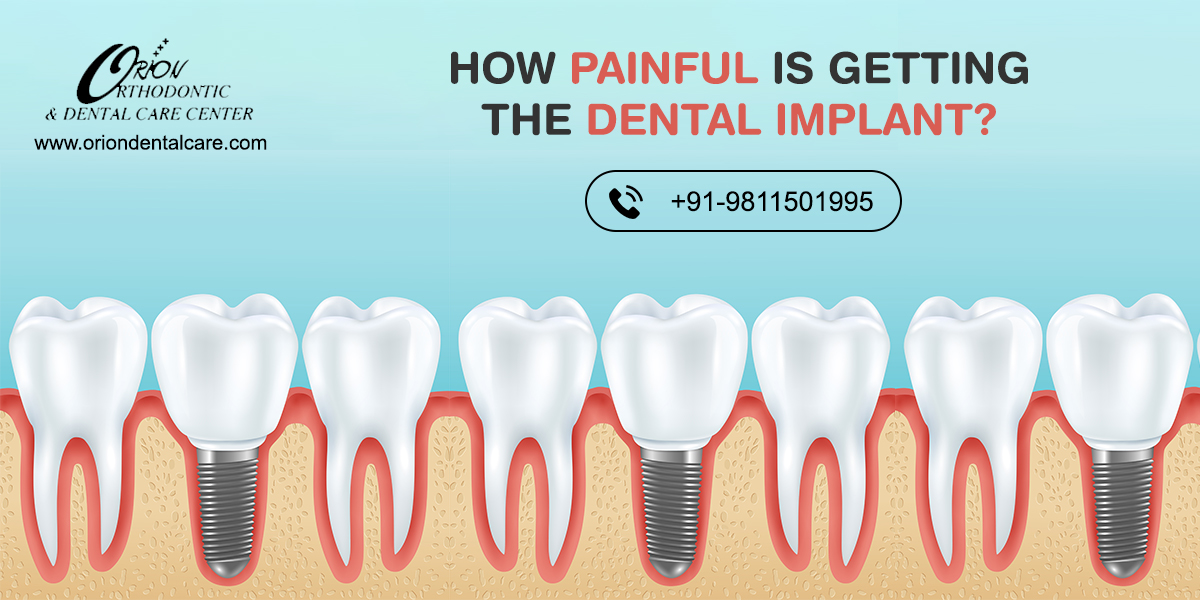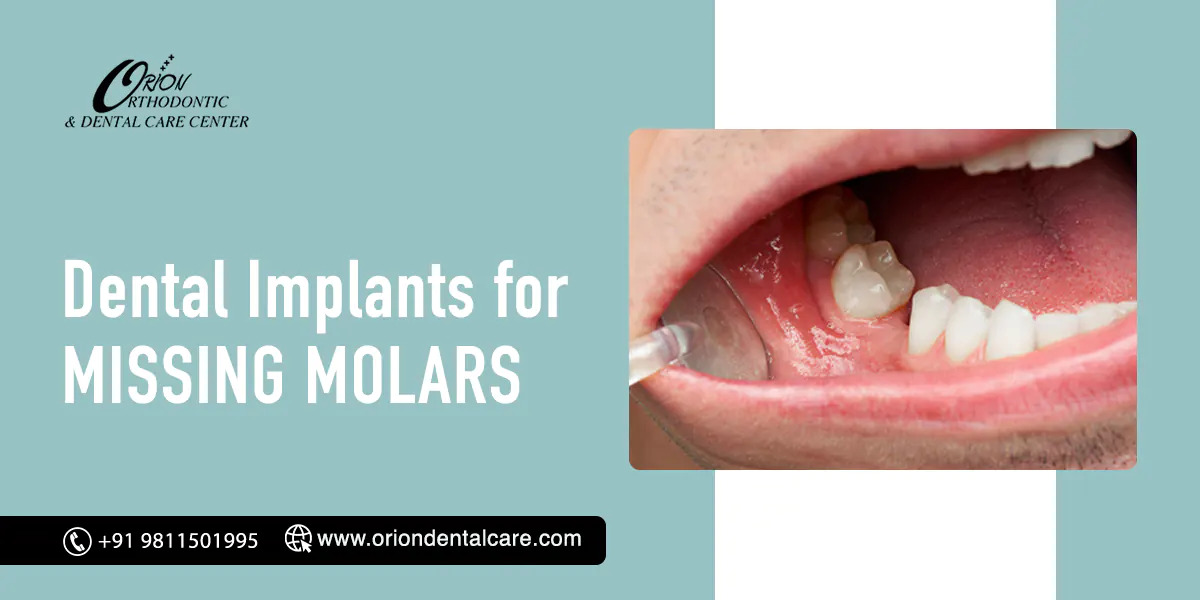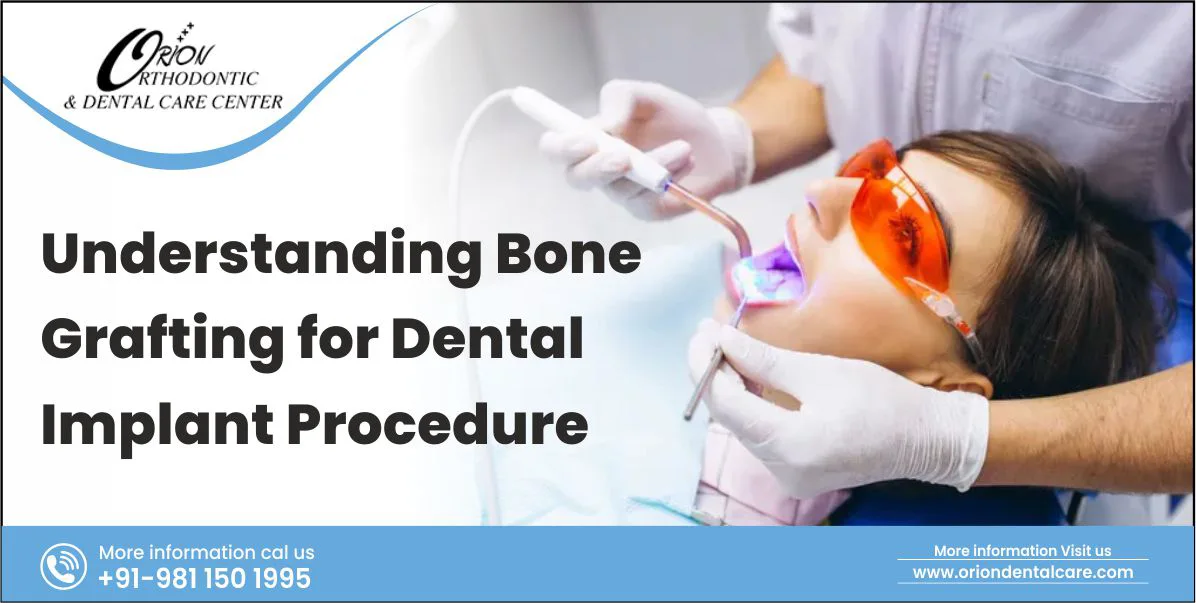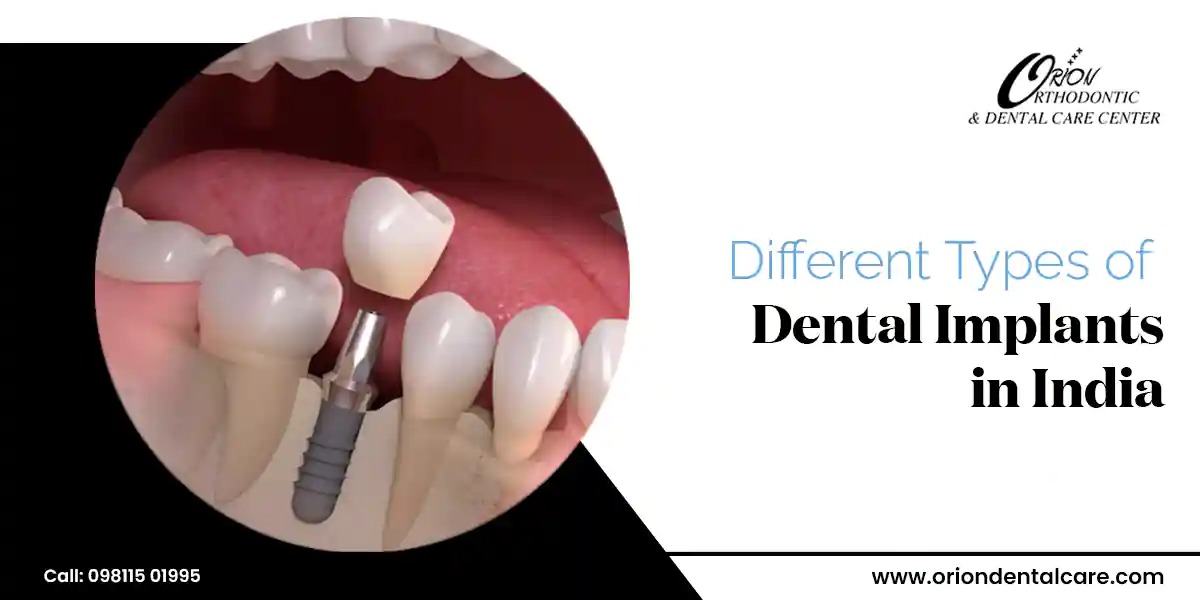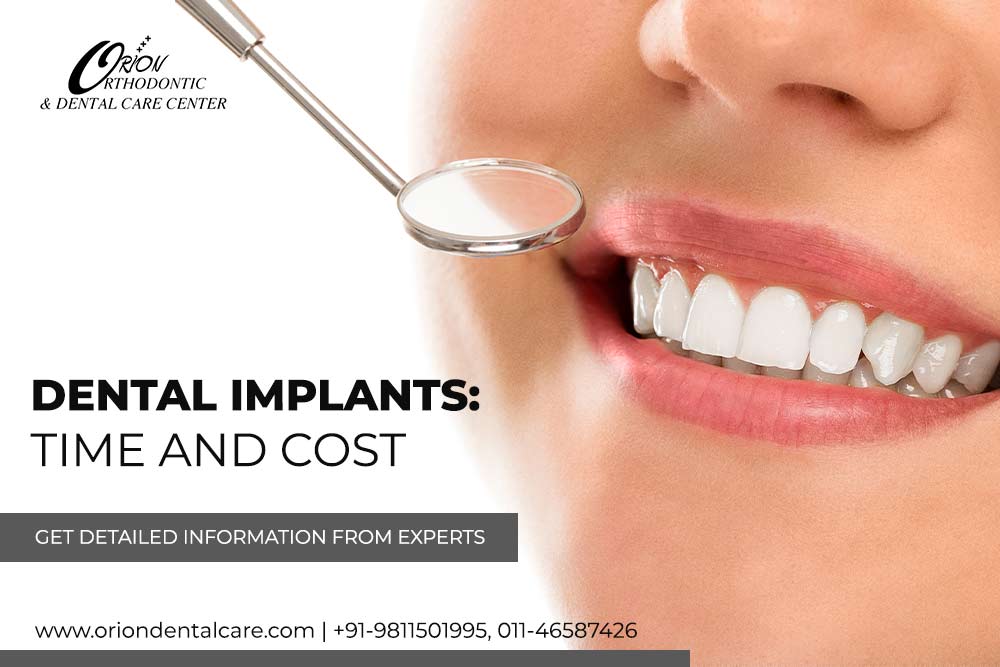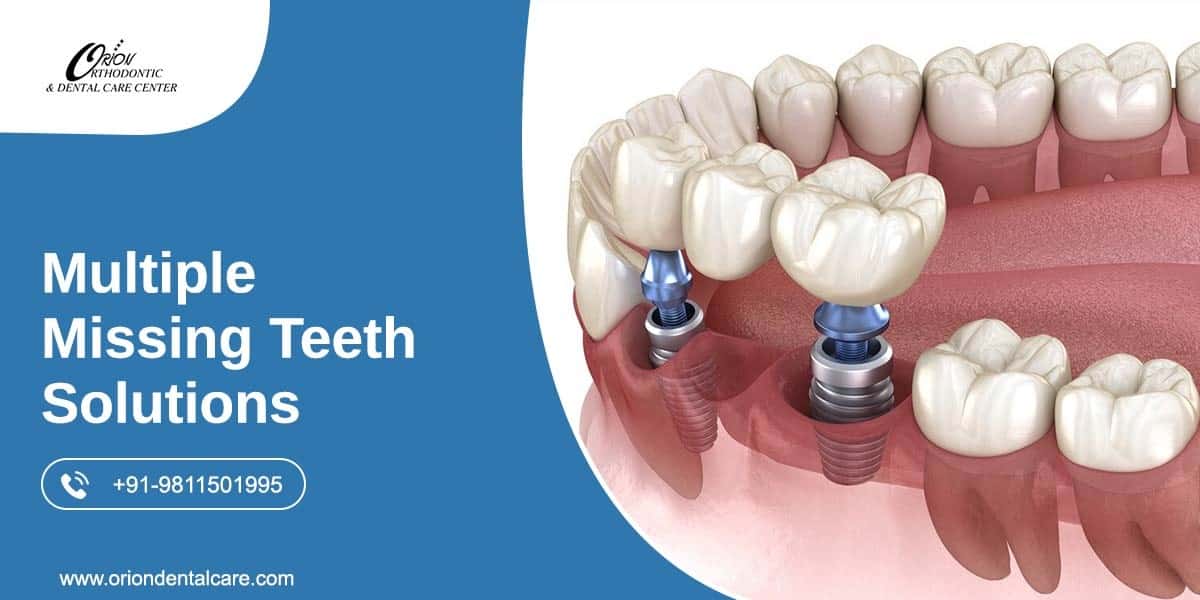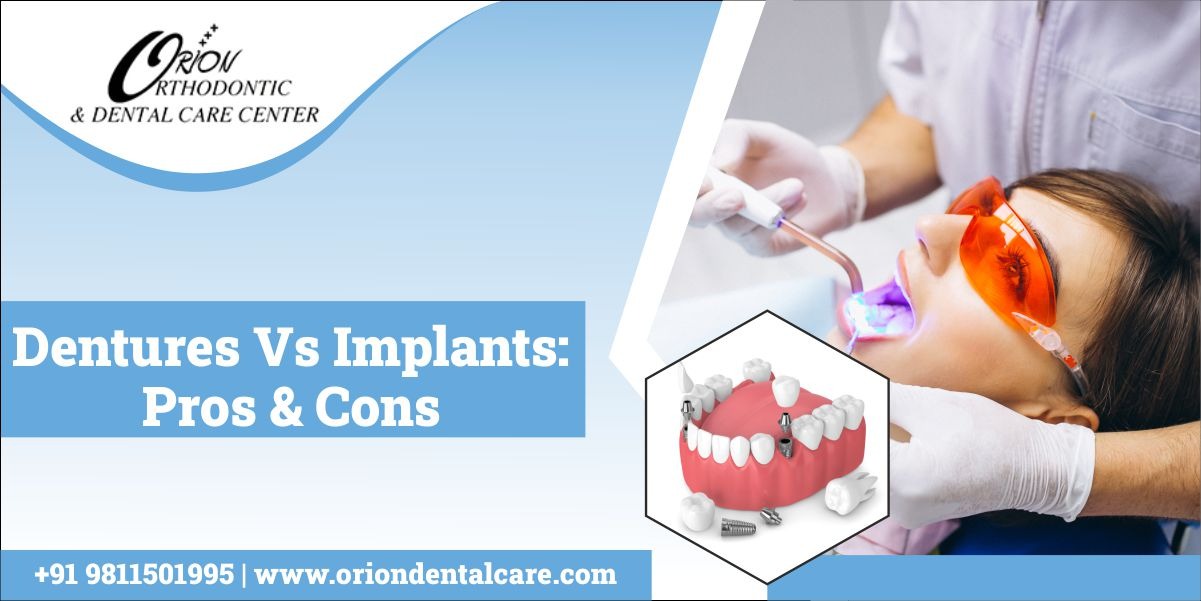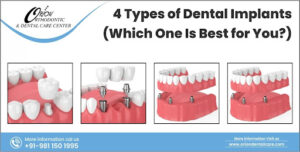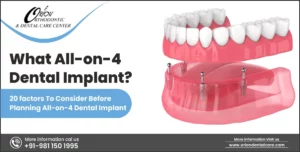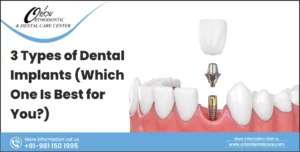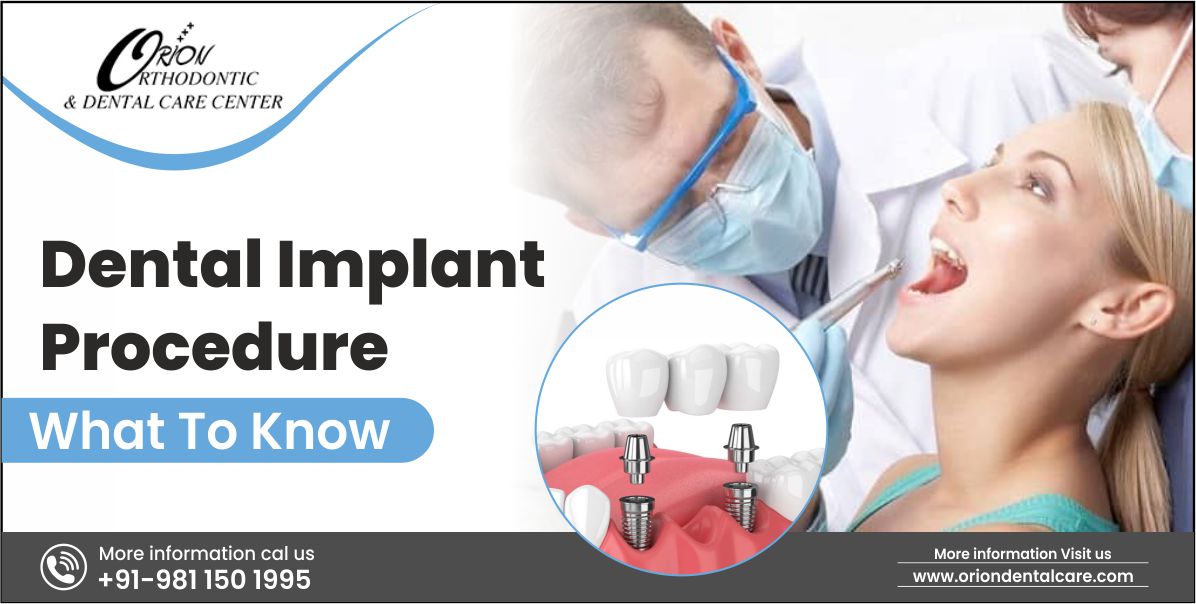If you are looking for a solution for your missing teeth to restore your functions and your beautiful smile as before, you are right on spot. Dental implants are the one-stop solution for you. They are metal, screw-like structures that replace your missing tooth roots and artificial teeth. They appear and function are almost the same as your natural ones or even better.
Dental implants are assumed to be expensive compared to other replacement options. But when calculating its cost to benefits ratio and considering the comfort, ease and longevity it provides, you will find that the advantages outweigh the costs significantly and are much value for money. While dentures or bridges may be less costly initially but has huge long-term maintenance cost compared to dental implants. We at Orion, present you with the best dental implant surgery at an affordable cost and excellent outcomes.
Cost of Dental Implant
The cost of dental implants at Orion ranges from Rs 15,000-Rs 45,000 per implant. Moreover, Orion also provides the Treatment packages that are available for all-on-four, as well as for full jaw cases.
Understanding Cost Breakdown in India:
Now, let’s explore the specific costs associated with dental implants in India:
- Single Tooth Implant Cost in India:
The cost of a single tooth implant in India can range from [INR 30,000 to INR 80,000.] based on the factors mentioned earlier. It’s essential to consult with a dentist for a personalized quote.
- Full Mouth Dental Implants Cost in India:
For individuals seeking a complete set of dental implants, the cost will be significantly higher. Full-mouth dental implant costs in India may vary, but they generally fall within . The range starts from INR 2,00,000 per arch, hence the full mouth will cost INR 4,00,000.
- Comparative Analysis with Global Costs:
While dental implant costs in India are relatively lower than in many Western countries, the quality of care and expertise offered by Indian dental professionals is often at par with international standards. This makes India an attractive destination for dental tourism.
Detailed Comparison between Dental Implant Materials and Their Cost
| Implant Properties | Titanium | Zirconia |
| Bonding with the bone | Excellent | Good |
| Biocompatibility | Similar | Similar |
| Colour | Grey and not very aesthetic | White, tooth-colored and aesthetically pleasing |
| Strength | Excellent | Good, but less than titanium and is more brittle |
| Heat absorption and transfer | More, very uncomfortable when eating hot foods |
Less, more comfortable when eating hot foods |
| Flexibility for adjustments | More, as both implant parts are separate | Comparatively less, as the an implant is a single unit |
| Chances of bacterial collection around implants |
More | Less |
| Resistance to corrosion | More resistant | Less resistant |
| Ease of placement | Excellent | Good |
| Variety of designs and components | Available in more variety | Comparatively less variety |
| Ductility | Excellent | Good |
| Long-term success | Have been proven as it has been used for many years |
Not proven as it is much recent |
| Surface Energy and tension | Excellent | Good |
| Cost (approximate) | 24,000–30,000 INR |
Different types of dental implants and their cost in India
If you are looking for a permanent solution for your missing teeth, then you are at the right place. At Orion Dental Care, we comprehend the significance of delivering clear knowledge about dental implants and their associated costs.
People seek dental implant treatment for different problems. One of the major advantages of dental implants is that it is suitable for every type of missing tooth, be it a single tooth or multiple tooth loss. Here’s a brief outline of the choices available:
Single Tooth Implant
For replacing a single missing tooth, a single-tooth implant is the best option. This pertains to a titanium post that is surgically inserted into the jawbone of the patient, crowned with a custom-made crown depending on the patient’s choice, preferably zirconia crowns.
Cost: ₹20,000 to ₹40,000 for the implant itself, with the crown adding ₹10,000 to ₹30,000 in India.
Implant-Supported Bridge
When there is multiple loss of adjacent teeth, an implant-supported bridge offers both stability and durability. This entails placing implants at either end of the gap and attaching them to a bridge.
Cost: ₹40,000 to ₹80,000 per bridge in India, depending on the number of implants required and the materials used.
All-on-4 Dental Implants
For replacing an entire arch of missing teeth, the All-on-4 procedure provides a fixed and functional solution with just four implants.
Cost: ₹2,00,000 to ₹4,00,000 per arch in India, offering long-term benefits and improved quality of life.
3-on-6 Dental Implants
Similar to All-on-4 implants, the 3-on-6 procedure replaces a full arch of missing teeth using six implants for added stability and support.
Cost: ₹3,00,000 to ₹5,00,000 per arch in India, considering the complexity of the case and materials used.
Factors Influencing Dental Implant Costs:
- Type of Dental Implants:
Dental implants come in various types, such as endosteal and subperiosteal implants. Endosteal implants are placed directly into the jawbone, while subperiosteal implants are positioned on top of the jawbone. The type of implant selected significantly affects the overall cost.
- Number of Teeth to be Replaced:
The cost of implants that are being replaced is somehow directly proportional to the number of teeth that are being replaced. Single-tooth implants will be less expensive than multiple teeth replacements.
- Material Used:
The material of the implant also plays a role in determining the cost. Titanium implants are the most common, but some individuals may opt for zirconia implants, which tend to be pricier.
- Dental Clinic and Location:
The location of the dental clinic and its reputation can influence the cost of dental implants. Clinics in metropolitan areas may charge more than those in smaller towns or rural areas.
- Additional Procedures:
Sometimes, additional procedures such as bone grafting or sinus lifts are necessary before implant placement. These procedures can add to the overall cost of the dental implant treatment.
Other Factors Influencing Dental Implant Costs In Delhi:
- Bone grafting requirement: If bone grafts are required because of thinning of bone, the cost will increase, and also the graft material will affect the cost.
- Type of abutment used: Angulated and zirconium abutments are costlier than the conventional ones.
- Type of crown used: Porcelain metal crowns are cheaper than the porcea ones.
- Type of anaesthesia used: Local anesthesia will be less costly compared to general anaesthesia (GA) and hospital admission will also increase the cost.
- Type of implant surgery: Guided implant surgery will be more expensive than the conventional ones.
With proper discussion and dentist’s assessment, accurate treatment costs can be worked out.
What are the materials used in dental implants and their cost?
Earlier all the dental implants used to be derived from a single material, called titanium, but now, with technological advancements, other materials are also used.
Titanium dental implant material:
The majority of dental implants are made from titanium and have been in use for more than 50 years. It is well-researched and sufficient data is available to prove it as the best material till date. It is ideal because it is light, strong and biocompatible (the body will not react to it). The most important advantage is that it allows the bone to develop around it fast and bond well to the bone (osseointegration). Dental implants are mostly made of an alloy (mixture of metals) which contains 90% of titanium and remaining other metals like aluminium and vanadium to provide more strength. The main disadvantage is its grey colour, which is not very aesthetic, especially when there is gum loss, which makes it even more visible. Also, it is a good conductor of heat, so some discomfort is felt while eating hot food.
Different brands of implants have similar compositions of metals, but the difference lies in the thread shapes on the implants or portion of the implant on the top where the crown attaches.
Ceramic implants:
They were a failure initially when they were used in the 1960s and ’70s, but now a new ceramic material called zirconium dioxide, commonly known as zirconia is being used. It is also strong and biocompatible. The main advantage is that it is white in appearance and does not absorb and transfer heat, so you will feel more comfortable. The disadvantage is that it combines post and abutment into one unit. Although this reduces fear of bacterial growth, it causes infection around gums and does not provide flexibility to adjust the upper piece accurately for maximum comfort. They are also very useful for people who are allergic to titanium. Since they are in use for less than 20 years, there is no sufficient data about their long-term success. But it is hoped to have very promising results.
There are certain properties that make some implants better than others:
- Biocompatibility: This is a property that shows the response of the material to the body. The more biocompatible the material, the better it is.
- Colour of the material: The whiter the material and closer to that of the tooth colour, the better it is, as it will have a very aesthetic look.
- Ease of placement: The more easily the implant can be placed, the better it is.
- Resistance to damage: The more it is resistant to damage, the better life it has.
- Absorption of heat: The less the material absorbs and transfers heat to the gums, the better it is.
- Modulus of elasticity: The implant material which has a modulus of elasticity comparable to the bone (18GPa) is considered better because this will result in better distribution of forces, lesser movement of the implant and quicker bonding.
- Strength and hardness: The stronger the implant material in terms of (tensile, compressive, shear and yield) strength, the better it is. This will prevent fractures and improve the stability of the implants.
- Ductility: For the shaping and contouring of the implant, ductility plays an important role.
- Surface energy and surface tension: This property determines the bonding of bone and the implant surface. The better the surface energy, the quicker the bone will form around it.
- Surface irregularities: The implant surface must have some roughness to increase cell attachment to the bone.
What are the Different Types of Dental Implants Used and Their Cost?
As every individual’s condition is different, so various types of dental implant procedures and techniques can be used.
Based on how the dental implant is placed within the tissue, they can be:
- Endosteal implants: These implants are most commonly used. Endosteal means ‘within the bone’. These types of implants are directly inserted into the jawbone. After some weeks, bone grows around the implant and anchors it tightly in place. It is further classified as:
- Root form dental implant: They are designed to look like the shape of a natural tooth root and are circular. They can be made into various combinations like smooth, tapered, with or without grooves, for good retention in the bone.
- Blade/plate form implants: They resemble the shape of a blade or plate. They can be put both in the upper and lower jaw bone, where there is sufficient bone available.
- Ramus frame implants: They are horseshoe-shaped, stainless steel devices, used mainly in the lower jaw where all teeth are missing and there is severe loss of bone.
- Transosteal/transosseous implants: They are mainly used in the lower jaw, and are very technique sensitive. They are also used where the jaw bone is very thin. It is placed through the chin bone, and then the denture is placed on it. Now, it is old-fashioned and new advancements have replaced it.
- Subperiosteal implants: These implants are not put inside the bone, but instead a metal frame is made to fit over the jawbone and below the gums.
- Intramucosal implants: These types of implants are made in the shape of a mushroom and have titanium projections. They are used to fix teeth on the upper jaw. The best thing about these implants is, they are a safe and effective alternative for endosteal implants.
- Immediate load dental implants: Also called ‘teeth in a day’ or ‘same day implants’ allow the dental and the crown in a single visit. They can be put when there is enough jawbone to properly support the implant and bear pressure on the crown.
- Mini dental implants: They are narrow endosteal implants, used mainly to support implant-supported dentures in the lower jaw. They are less-invasive and done for people who have bone loss, but bone grafting cannot be done.
Benefits Of Dental Implants
Dental implants have countless benefits and are not only just to fill the gaps in a smile. They provide a stable foundation for replacement teeth, restoring the ability to chew and speak comfortably. Unlike traditional dentures, implants are securely anchored in the jawbone, preventing issues like slipping or clicking.
Moreover, implants stimulate bone growth, helping to maintain the natural structure of your jaw and prevent bone loss that can occur with missing teeth. Dental implants do require proper care and with that dental implants can endure for a lifetime, which makes them a cost-effective and long-term key for the replacement of missing teeth.
At Orion Dental Care, we’re committed to helping you achieve a healthier, more confident smile with our expert implant services.
At Orion Dental Care, we believe in transparent pricing and personalized treatment plans tailored to your needs. Invest in your oral health for a brighter, confident smile.
Takeaway
We, at Orion, understand that each individual has different needs and conditions and so all our treatment plans are customised and tailor-made as per your needs and wishes. Considered as one of the best dental clinics in Delhi, our highly qualified and trained dentists provide you with the latest treatments and advanced techniques in dental implant surgery with the best outcomes at your pocket-friendly costs. So, don’t wait!We are here to serve you.
Frequently Asked Questions (FAQs)
- What is the average cost of a single tooth implant in India?
The cost of a single tooth implant in India can vary based on factors like location, type of implant, and dental clinic reputation. On average, it may range from [INR 30,000 to INR 80,000.]. However, it’s crucial to consult with a dentist for an accurate quote.
- Are there different types of dental implants, and do they have varying costs?
Yes, there are various types of dental implants, including endosteal and subperiosteal implants. The sum cost may vary depending on the type of implant you opt for. Endosteal implants, being more common, maybe more cost-effective compared to subperiosteal implants.
- How does the number of teeth being replaced affect the cost of dental implants?
The cost of dental implants that will replace the missing teeth is directly proportional to the number of teeth that need to be replaced. Single tooth implants are generally less expensive than multiple teeth replacements or full mouth implants.
- Do dental clinics in different locations charge different prices for implants in India?
Yes, the locale of the dental infirmary can impact the cost of the treatment. Infirmaries in cosmopolitan areas tend to authorize more than those in smaller towns or rural regions. However, it’s essential to consider factors like expertise and facilities offered by the clinic.
- What materials are commonly used for dental implants, and do they impact costs?
Titanium is the most common material for dental implants, but some individuals opt for zirconia implants, which can be pricier. The material chosen can affect the overall cost of the implant.
- Are there additional procedures that may contribute to the overall cost of dental implants?
Yes, additional procedures like bone grafting or sinus lifts may be necessary before implant placement. These procedures can add to the total cost of the dental implant treatment.
- Is dental tourism a viable option for getting affordable dental implants in India?
Yes, dental tourism is a popular option, as dental implant costs in India are relatively lower than in many Western countries. Patients can benefit from cost savings without compromising on the quality of care provided by experienced Indian dental professionals.
- How can I get an accurate estimate for my dental implant treatment in India?
To obtain an accurate estimate, it’s recommended to schedule a consultation with a qualified dentist. During the consultation, the dentist will assess your specific needs, discuss treatment options, and provide a personalized cost estimate based on your unique case.
Check Out Our Latest Blogs

